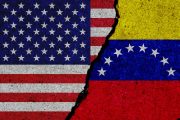After securing the greatest number of votes in the first round of Chile’s presidential election last month with strong support from the Communist Party, self-styled “Socialist” Michelle Bachelet cruised to a widely anticipated victory in a run-off vote for the Chilean presidency held December 15. The former defector to the mass-murdering Soviet bloc, who took refuge under the brutal Communist regime ruling East Germany, is hoping to replace Chile’s freedom-preserving constitution with one that allows government to take over everything from healthcare to higher education.
According to analysts, with the “deep reforms” promised by Bachelet, the foundation of Chilean liberty and prosperity are now under threat. Latin America more broadly, meanwhile, has been almost completely conquered by a tightly knit network of communist and socialist forces working to impose tyranny on the people of the region. However, whether Bachelet will succeed in her quest to re-shape the most prosperous and successful nation on the continent remains to be seen, and opposition to the plan is growing.
“Chile, one of the few remaining bastions of freedom in Latin America, is in danger of going communist,” noted anti-communist author and analyst Trevor Loudon. “Can the U.S. afford to lose yet another friend? Can the West afford to lose Chile — one of the most strategically situated nations in the world? The encirclement rolls on.” Along with numerous other experts on the region and communism, Loudon argues that the ongoing socialist takeover of Latin America represents a major threat to the United States and freedom.
During her last stint in Chile’s highest political office from 2006 to 2010, the Socialist Party leader avoided much of the extreme statism so prevalent across Latin America — leaving the nation and its foundations mostly intact as one of the few remaining outposts of relative freedom and prosperity in a region now dominated by socialist and Marxist machinations. This time, however, she has vowed to radically transform Chile, starting with the liberty-friendly Constitution that economists argue has been a key component in the country’s extraordinary success thus far.
If Bachelet gets her way, a radically larger and more intrusive government will take over healthcare, higher education, and more. Big tax hikes and huge spending increases are also on the agenda. “Chile has looked at itself, has looked at its path, its recent history, its wounds, its feats, its unfinished business and this Chile has decided it is the time to start deep transformations,” Bachelet claimed in front of supporters on Sunday after winning the election against the more liberty-oriented Evelyn Matthei.
The president-elect also promised to “responsibly” carry out the “deep reforms” that she claimed were allegedly “needed” in the wealthiest nation in the region — presumably an effort to soothe escalating fears of a Hugo Chavez-style socialist revolution that could plunge the nation into poverty and chaos. With her alliance with the Communist Party having secured a large enough majority in the legislature to push through much of her agenda, Bachelet also claimed that those who “want change” represent a “broad majority,” and so, “it’s time to put them into action.”
“Today in Chile we’re in the majority and it’s time we moved forward to fulfill the dream we all have, to again believe in ourselves, and to believe that there’s strength in unity,” Bachelet said, echoing the empty rhetoric of other socialist and communist leaders in the region who have come to dominate Latin American politics, largely through deception and promises of redistributed wealth. “I am proud to be your president-elect today. I am proud of the country we’ve built, but I am even more proud of the country we will build.”
While Bachelet has managed to convince much of the Chilean public and the establishment press around the world that her Socialist Party and its allies represent the “center-left,” other evidence suggests that is highly unlikely. Her political party, for example, once led by fervent Castro ally Salvador Allende, who planned to impose Cuban-style tyranny on Chile, is part of the Socialist International, the largest and most influential global alliance of “democratic” Marxist political forces in the world.
Bachelet’s Socialist Party of Chile, which is openly allied with the Communist Party as part of its “New Majority” ruling alliance, is also a key player in the Foro de São Paulo (FSP, or São Paulo forum). The ruthless network of socialist and communist parties, along with Marxist narco-terrorist forces, was founded by Fidel Castro, the Sandinistas, and other prominent pro-communism totalitarian luminaries. It now dominates Latin American politics as the socialist takeover accelerates.
Bachelet herself, meanwhile, still fondly remembers her time living in exile behind the Iron Curtain. “Whether the readers like to hear this or not, the time I spent in Potsdam and Leipzig was a very happy part of my life,” she was quoted as saying in German media reports about her years living under the communist rule of the Soviet-backed East German dictatorship. “My experience in Germany was beautiful.” Of course, the experiences of countless others — especially victims of the infamous East German secret police, the Statsi — were dominated by horror, torture, persecution, and more.
Most alarming to critics is her drive to replace Chile’s strong pro-liberty constitution with a new one, which analysts say is aimed at facilitating Bachelet’s radical agenda. “The new constitution will be sent to Parliament in my first year of government,” she vowed in a pre-election interview with a Chilean newspaper, adding that she already has a “team of experts” working on the scheme. “A democratic constitution is essential in this new chapter of Chilean history.”
Details of the controversial plan to fundamentally transform Chile’s system of government remain murky. However, experts have noted that the nation’s constitutional system — adopted after Allende was ousted by the military for conspiring to enslave Chile under communist tyranny — is largely responsible for the country’s unparalleled success in a region currently dominated by socialist strongmen, poverty, and increasing totalitarianism from Cuba and Venezuela to Brazil and Ecuador.
Still, apparently oblivious to the consequences of such machinations across Latin America, Bachelet’s allies are equally zealous for the vaguely defined “change” promised during the campaign. “She will govern a country with profound demands for change,” claimed Senator Ricardo Lagos Weber of Bachelet’s New Majority coalition, adding that he expected the opposition to roll over for “what the people” are allegedly demanding. “The country isn’t flat on its back, it is healthy, organized, growing economically, creating jobs and improving salaries. But it is also deeply unequal.”
Addressing “inequality,” of course, has been the rallying cry of virtually every socialist strongman to seize power in the region over the last decade as part of what analysts continue to downplay as a mere “pink tide.” As part of her campaign, Bachelet, for example, promised that government would use taxpayer funds to provide “free” university education, seizing on protests whipped up by radical communist agitators to claim that the “people” are demanding it. The groundwork for more socialism down the road will undoubtedly be laid in other sectors as well — at least if Bachelet and her allies succeed.
In nearby Brazil, “moderate” President Dilma Rousseff, a “former” communist terrorist, used a similar strategy to take power, styling herself a “moderate” seeking “change.” Now, she rallies her allies in the Communist Party amid an increasingly radical effort to “change” Brazil. Indeed, the FSP strategists seeking to foist socialism on Latin America have mastered the art of seizing power, relying on deception, oil money from Venezuela, drug money from Marxist terror groups like the FARC, international communist allies, and more.
Unsurprisingly, communists around the world have high expectations for Bachelet in Chile. The Communist Party USA, for instance, wrote in its propaganda outlet that her election, along with her Communist Party and fellow Socialist allies in the legislature, would “have profound implications not only for the Chilean working class, but for Western Hemisphere politics and beyond.” While strong opposition remains, Bachelet’s alliance is already boasting that it does not foresee “obstructionist” measures by the opposition to stop the imposition of “what the people are demanding.”
Of course, more than a few analysts and businesses are already getting nervous. But at this point, with Bachelet having secured more than 60 percent of the vote in the run-off, liberty-minded forces in Chile say there is little left to do except hope for the best, prepare for the worst, stifle the socialist march toward “progress” as much as possible — and work to ensure that the looming damage can be undone before the anticipated bloated and corrupt welfare state manages to sink its roots too deep. The end result of the alternative — letting the socialists and communists succeed — can be witnessed across Latin America. It speaks for itself.
Photo of Michelle Bachelet: AP Images
Alex Newman, a foreign correspondent for The New American, is normally based in Europe after growing up in Latin America. He can be reached at [email protected].
Related articles:
Resurgent Communism in Latin America
The 40th Anniversary of Pinochet’s Rise to Power in Chile
Chilean Legislature Establishes National Day for Unborn
U.S. Ambassador Outs Powerful Totalitarian Cabal in Latin America
Exposure of Radical CFR Latin America Boss Offers Broad Insight
South American Union Selects Socialist Leaders
Communist Cuban Tyrant Raul Castro to Lead Latin American Bloc
New Americas Group Includes Cuba, Not U.S; China Cheers
“Moderate” President of Brazil Rallies Communist Party Allies




